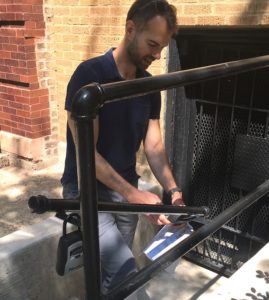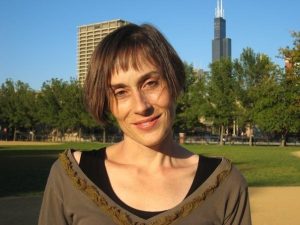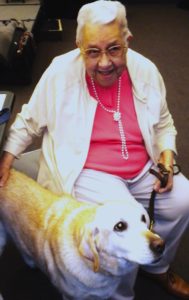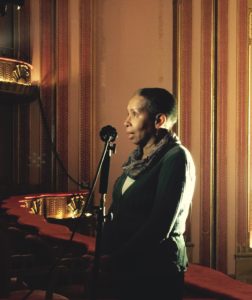My Audrey and Wanda weekend
August 3, 2017 • 10 Comments • Posted in blindness, careers/jobs for people who are blind, memoir writing, public speaking, radio, teaching memoir, writing, writing promptsAnd now about the two Writing Out Loud events I did with writers from my memoir classes last week.
Audrey Mitchell opened our presentation at Skyline Village on Friday by reading one of her essays from Writing Out Loud. She took questions from the audience afterwards and wowed them with stories of her life and her decision to enroll in our Me, Myself and I class at the Chicago Cultural Center. “I was into Geneology,” she said, explaining that her research led her to the U.S. Census. “I found out my great-grandparents lived in Edgefield County in South Carolina back in 1870; I have oral history and written data to back that up,” she told the audience. “But what I’m missing is the voice of my older relatives, what they were thinking, what they were feeling and like that. That’s why I keep taking the writing class, to keep their stories alive, so the stories I know about them — and about my own life — won’t be lost forever.”
We were treated to lunch at the event, I gave a short writing exercise after dessert, and everyone sounded pleased to read a bit of their work out loud. Some stayed late to ask Audrey about the memoir-writing class she leads at her local library, and others had me sign copies of Writing Out Loud to read at home. An unqualified success.
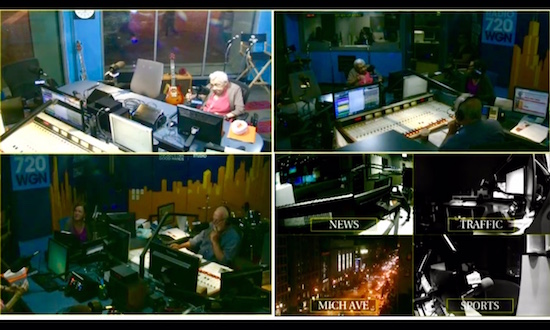
Our friend Laura did a screen capture of the live feed screen from the WGN studio. There’s Wanda in the upper left screen.
The next night 95-year-old writer Wanda Bridgeforth joined me on WGN Radio for Dave Hoekstra’s Nocturnal Journal program. From the WGN web site:
Dave Hoekstra talks with author and journalist Beth Finke about her book Writing Out Loud: What a Blind Teacher Learned from Leading a Memoir Class for Seniors.
She talks about how losing her eyesight affected her career and her approach to writing (and listening to people), and celebrating the “community” of all the people she’s connected with during her time teaching the course. One of her students, Wanda Bridgeforth shares some of her stories of growing up in Bronzeville and going to high school with Nat King Cole and Redd Foxx , why she was inspired to take Beth’s class, and more.
Dave was an excellent host — he’d actually read Writing Out Loud before the show and complimented the book on the air. “It’s “very conversational,” he told his listeners. “Very breezy.”
The interview started with questions on how losing my sight changed the way I write, and when he turned to Wanda to ask her what made her sign up for my memoir-writing class, she laughed and described coming to one of my booksignings a decade ago. “When I saw she was blind,I thought, holy Toledo, how in the Sam Hill is she going to teach writing? I had to find out!”
We all laughed along, but soon Wanda got quite serious. “Her class was my salvation,” she said, almost whispering now. “I was just retired at the time and at loose ends.”
A music lover, Dave was particularly intrigued with Wanda’s years at DuSable high School on Chicago’s South Side: Wanda walked the halls there with jazz great Nat King Cole and Dinah Washington, Queen of the Blues. “Nat Cole added King to his name later,” Wanda said with a laugh. “You know, like Old King Cole!” She remembers Dinah Washington when she was Ruthie Jones, and she knew comedian Redd Foxx when he was John Sanford, another DuSable alum. “he was a bowl of fun,” Wanda told Dave during the interview, explaining that the TV show Sanford & Son was named for John Sanforrd’s brother Fred, who also went to DuSable. “We only had one school we could go to, we were a group, we all went to the same parties, shopped at the same stores.”
When Dave asked how Wanda felt about living in Bronzeville before integration, she said, “I think we were so used to segregation that we just accepted it.” She told Dave that she regards her time at DuSable among her happiest years. “We had our city within a city, we hired our own, we patronized our own. We were family.”
But hey. Wait a minute. Why the Sam Hil am I quoting the entire interview here? You can hear Wanda tell her stories in her own voice — the interview is available online now, just click here and hit play. I promise you won’t be disappointed.
